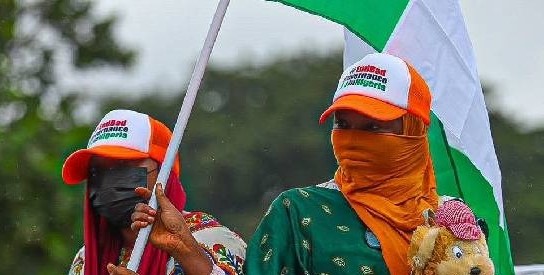ECONOMIC activities are beginning to gather pace in states like Sokoto, Taraba, Adamawa, Kebbi following the first day of the hunger protest across Nigeria.
But in cities like Lagos, Port Harcourt in Rivers State, and Benin City in Edo State among others, the protests have continued as the demonstrators demand for the betterment of the harsh economy.
In Lagos State, the protesters gathered in Ojota. Security operatives were on the ground to ensure a hitch-free exercise. The state’s Commissioner for Information Gbenga Omotosho addressed them and assured them that the government would address their demands.
It was a similar situation in Port Harcourt. While residents of many areas in the city continued their daily activities, protesters marched from the Pleasure Park and camped in front of the Federal Secretariat. These were later addressed by police authorities.
In the nation’s capital – Abuja – hundreds of protesters converged at the Berger Roundabout. But police operatives fired teargas to disperse the demonstrators. They later reconvened at the Moshood Abiola Stadium.
Neighbouring Kaduna is, however, relatively calm with no signs of protesters on the streets.
The first day of the protest was largely peaceful across the 36 states and the FCT. However, in states like Kano, Kaduna, Katsina, Borno, Jigawa and others, there was violence, killings, and looting, prompting the governments to impose curfews on the state.
Days before the protests, calls for the demonstrations had reached a crescendo, especially on social media. Young Nigerians, battered by the economic hardship that has seen the naira greatly devalued and the cost of essential items beyond the reach of millions, urged the government to restore the subsidy on petroleum and address other issues raised.
The country’s security agencies including the police and the Department of State Service (DSS) had issued stern warnings in the leadup to the protests, asking the demonstrators to shelve the exercise.
President Bola Tinubu had after months of negotiations signed a new minimum wage of N70,000 and reeled out other measures including the distribution of palliative – efforts considered by many as part of last-minute moves to stop the protests.
However, the protests took place across the nation with millions trooping to the streets. The Inspector General of Police Kayode Egbetokun on Thursday put officers on red alert, saying some cops were killed on the first day of the protests.
“Police stations have been destroyed. There have been attempts to take over government houses,” Egbetokun said.
“In places like FCT, Kaduna, Kano, and Gombe, among others, we recorded incidents of unprovoked attacks on our security personnel where one policeman has been reported murdered and others seriously injured. In light of the current situation, the Nigeria Police Force has placed all units on red alert. Our officers are fully mobilised and prepared to respond swiftly and decisively to public safety and order,” he said.
But the Organised Civil Society has faulted the firing of tear gas at protesters in some parts of the country.
“The anti-hunger protesters sensing danger and possible violent clash, decided to quietly move in peaceful procession to the Eagle Square, where they had earlier designated to hold their peaceful protest,” the United Action Front of Civil Society said in a Thursday statement.
“On getting to the Eagle Square, security agents swooped on them and unleashed mayhem on peaceful [rotesters with tear gas canisters, injuring several unarmed and defenceless protesters with three protesters reported to have fainted.”
While the organisers say the protests will be for 10 days, authorities expect the demonstrators to reconsider their plans.







